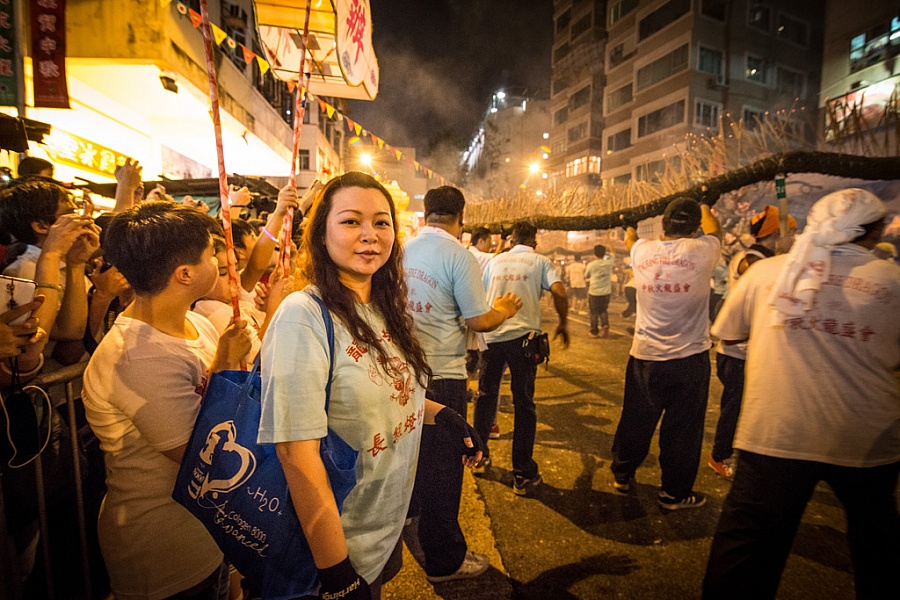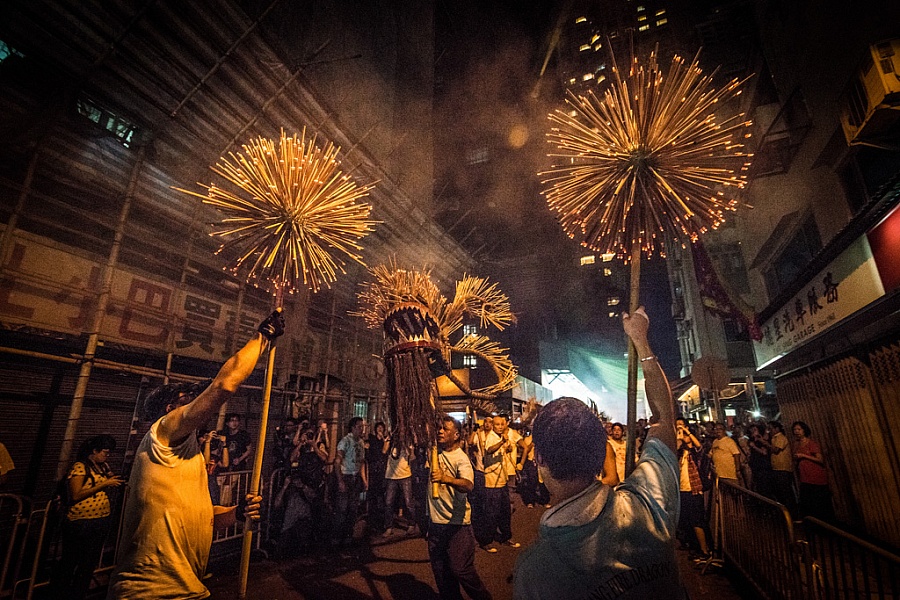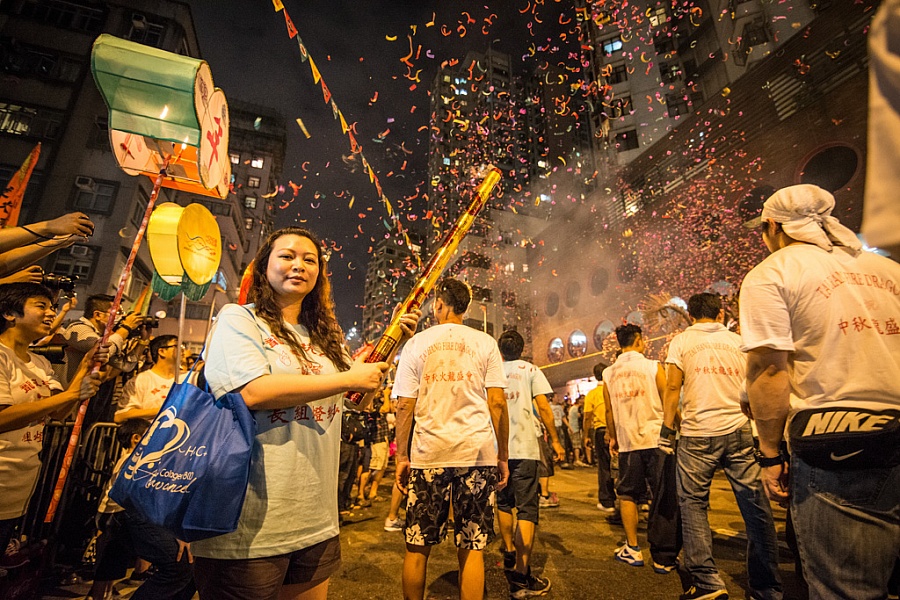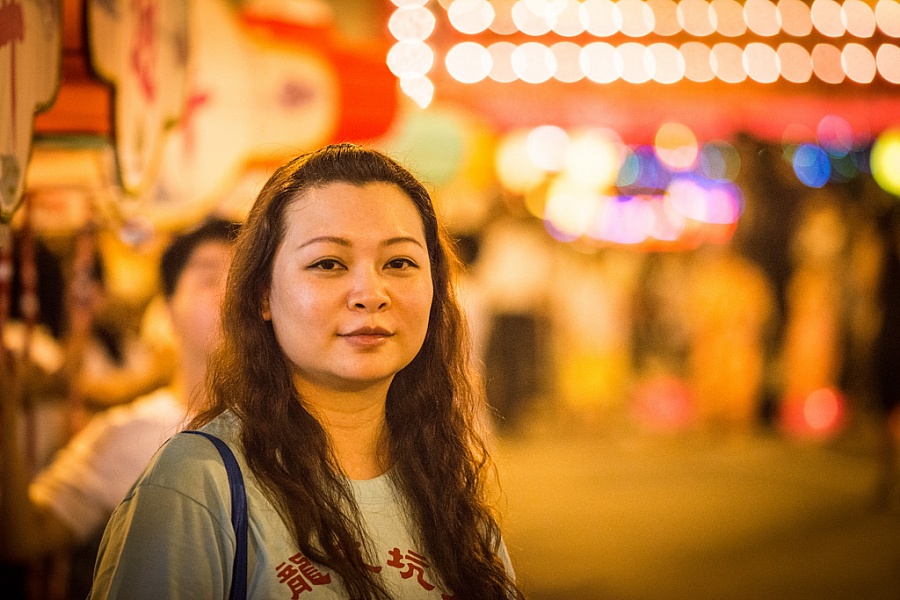I am certain quiet a number of you will have heard of the story about Tammy and her family even if you’ve never met them. Their story made newspaper headlines several months ago. Tammy’s family faced intimidation after they ignored pressure to sell their home for redevelopment. The intimidation came in the form of a six by five feet, black-and-white banner of a ghostly-looking male face. Draped over the external wall of the tenement building that stands next to Tammy’s family home, the frightening image stared into the window of the living room that has been the centrepoint of Tammy’s family life for generations. Her family lived under the shadow of the ghastly threat for a week before the public learnt about what happened.
Tammy Yeung Wing-man is a Tai Hang resident. She’s also a long-standing member of the Fire Dragon lantern team. Some of her relatives are in the Fire Dragon Dance squad as well. For instance, her cousin is a member of the prestigious dragon head team. Tammy and I met at last year’s Fire Dragon spectacle. She happened to be standing next to me as I was talking to the Urban Diary photographer, Pak Chai, about where we could capture the best images of the dragon dance. Tammy didn’t hesitate to give us some very useful tips, and the friendship that ensues between us has given me an insight into the fast-changing face of Tai Hang.
Like all the Tai Hang residents we’ve met, Tammy, a marketing executive, is exceedingly proud of the long tradition of the Fire Dragon dance – it dates back to 1880 – and she’s always ready to explain the finer details of the ritual to anyone. Like many of her neighbours, she became a member of the Fire Dragon Dance squad when she was only a kid. Later on, she went to Canada for high school and university, but she’d travel back to Hong Kong every year. However, the Fire Dragon Dance of today isn’t the same as how she remembers it to be when she’s small.
“I like the old days more,” Tammy said, “there weren’t any police officers getting into the way of the crowd, there were no volunteers helping the police control the crowd, no barriers separating the crowd from the dragon. It was a lot more carefree in the old days. No barriers, no police taking excessive safety precautions, no killjoys. Shouldn’t that be how we celebrate a festival?”
And when I told her I’d earlier spoken to Natural about the gender bias that comes with the 19th century tradition, she said the crowd control measures of recent years were also to blame for depriving female members of the Fire Dragon Dance squad the chance to dance the dragon.
“I’ve danced the dragon, that was many years ago. I didn’t have the strength to hold the dragon and I needed help from my cousins and friends. But they used to be more relaxed about female members dancing the dragon. In the past, there weren’t police and volunteers getting into the way of the parade, so moving around was a lot easier,” she said.
The three properties that have come up against the less savoury side of urban redevelopment belong to Tammy’s family, her maternal grandmother and her maternal aunt’s family, or 16 people in all. They occupy the entire top floor of a six-storey tenement building. Tammy moved to nearby Tin Hau recently but she regularly goes back to her family home to see everyone.
“Although some tenants in our building have sold their properties, the shop owner on the ground floor and our family have no plans to sell. We own three properties, and as long as we hold out, no redevelopment can take place,” Tammy said.
The redevelopment of old buildings has become easier after the amended Land (Compulsory Sale for Redevelopment) Ordinance came into effect in April 2010. Under the ordinance, anyone who’s acquired an 80% ownership of any building aged 50 years or above can apply to the Lands Tribunal to have it compulsorily sold for redevelopment.
“It happened one afternoon, grandma saw this ghastly banner hanging outside, so she called to tell us what happened. It was disturbing, we had to look away every time we passed the window. Grandma is old-fashioned, she wants the living room to be fully sun-lit, so there are no curtains over the windows,” she said.
Tammy believes the incident is related attempts to buy out her building for redevelopment. “The rooftop from where they hung that banner used to belong to a family whom we’ve known for years. The two families were living side by side for decades, we know each other. We used to chat to each other from our own rooftops. They’ve sold their property and moved out already. If it wasn’t related to the redevelopment attempt, does it mean the family whom we’ve known for years came back with the right key to unlock the gate to the rooftop that no longer belongs to them, and unfurled that horror to scare us?”
Although several police officers visited their home to investigate the incident, to date, no arrest has been made and no one has given Tammy’s family any update on the investigation. The silence on the case makes no sense to Tammy. “I am rather certain the police should have no difficulties finding the culprit. It was a huge banner and an easily recognisable image. I am sure the person who did it had to go to some special shop to print the banner,” she said.
The family used to receive phone calls from a developer that specializes in buying out old buildings for redevelopment, at least once a week, asking them to sell their properties. It has stopped contacting them since the incident. “The phone calls were very short. They asked us to let them know under what conditions we would sell. Even though we ignored them, the phone calls made us constantly aware that someone’s out there wanting to buy our home for redevelopment, and that forces us to think about what to do. You know, I still have no idea how they got our number,” she said.
Tammy’s father has several properties near Tai Hang because her family wants to ensure wherever it moves, everyone will still be close to grandma. For Tammy’s family, keeping the Tai Hang home is to ensure grandma can continue to live in the apartment and the neighbourhood that she’s most familiar with. It’s also a way to keep everyone in the extended family close: every Saturday, they meet in their Tai Hang home for a family feast.
Although Tammy’s family isn’t prepared to sell their properties, Tammy believes they will give in eventually. This is because as one family moves out after another, the tenement building has lost the communal vitality of old. She misses the good old days when the building was full of people that she could hear people chatter and laugh as she walked up the staircases to reach her top-floor home.
She also has fond memories of adults watching television in the rooftop dining room every evening, and of kids playing table tennis and football in the living room. They lost the rooftop dining room several years ago because it was an illegal structure and the family was ordered to have it demolished.
Tammy’s grandfather used scrap wood to build a table tennis table for the kids. Although the demolition of the illegal structure meant that the family has lost a significant chunk of space, their home is still big enough to hold the table tennis table. They want to keep the table and pass it on to the next generation. But if they can’t keep their home, Tammy sees little chance of keeping the table.
Tammy’s Q&A
Q: What do you like the most about Hong Kong?
A: Food, we have excellent food in Hong Kong, especially lobster basked with cheese. I studied in Canada, where there’s always an abundant supply of fresh lobster. But no matter how the lobster is served, cold in the Western style, or baked with cheese as the Chinese restaurants would do it, it’s just not as tasty as what I can get in Hong Kong.
Q: What do you dislike the most about Hong Kong?
A: Air pollution. I developed skin allergy because of air pollution.
Q: What does Hong Kong need to do for it to be a sustainable city?
A: I am uncertain whether redevelopment is giving us genuine benefits. The government said Hong Kong needs land to build more houses, maybe redevelopment is a way to achieve this goal. But it’s certainly very bad for the elderly – that’s my first person experience. I am telling you from my grandmas’ experiences. My paternal grandma’s health deteriorated rapidly after she moved out of her old home after it’s sold for redevelopment. She used to live in a tenement building and she had to climb all those staircases but that actually kept her in good shape. Now she has to walk with a stick. My maternal grandma is older but since she has to walk up and down flights of stairs everyday, her health is very good. She walks fast, climbs the stairs without any difficulty and she has no problems with her heart and blood pressure. I think we have to keep the well-being of our elderly in mind if a city is to be sustainable.






